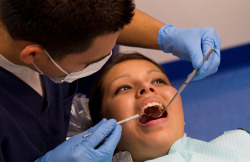It’s no secret that stress is bad for us. Not a day goes by that I don’t see articles like this with tips for living a less stressful life. Stress is known to affect our moods, our metabolism, and even our risk for heart attack.
I was astonished (though not altogether surprised) therefore, when I came across a new research paper about the role of cortisol—that same stress hormone that wreaks havoc on our metabolisms when we’re stressed—in periodontal disease. It turns out that cortisol is released in periodontal pockets and increases growth of oral pathogens like P. gingivalis:
“This study provides further support for the idea that stress-induced hormone; cortisol may influence the growth of P. gingivalis. This specific effect may be involved in the relationship between stress and periodontal diseases.”
It makes sense, really, if you think about it.
I recently attended a weekend conference that had quite a rigorous agenda. Not only were the days long and full of intense scientific discussion, but everyone was at the top of their game trying to make the most of unique networking opportunities.
Now I don’t want to be gross, but I remember thinking to myself at the end of day two, “Is it just me, or does everyone here have awful breath?”
Judging by this most recent study, it wasn’t just me. The combination of a bombardment of information and a lot of schmoozing had given nearly everyone in this group of dental professionals what I’ve since termed “stress breath.”
This new research provides a good insight into those patients who have little to no traditional signs of periodontal disease but who test high for periodontal pathogens like P. gingivalis. You can treat these pathogens with the most advanced antimicrobial tools in the world, but if you don’t treat the source of the problem (in this case, stress), it will never fully go away.
This is why it’s no longer good enough to approach periodontal disease from a visual perspective. This is why you have to transform your dental practice into one that incorporates advanced oral inflammation reduction, wellness, dental force, and sleep. Because now that we know periodontal disease is more than what goes on in the mouth, we must open our minds and broaden the scope of our care accordingly.



Pingback: Most Wanted: The 3 Worst Bacterial Villains - OSH News NetworkOSH News Network
Pingback: Most Wanted: The 3 Worst Bacterial Villains - OSH News NetworkOSH News Network
Pingback: Low Birth Weight Risk Higher for Moms with Perio - OSH News NetworkOSH News Network